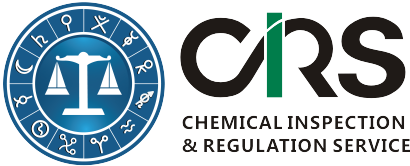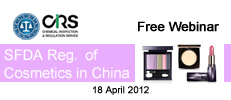China SFDA publishes draft guidelines for the registration and evaluation regarding cosmetics for children
15 Feb 2012, China SFDA (State Food and Drug Administration) has launched draft guidelines for the registration and evaluation of cosmetics for children in China. The deadline for public comments is 29 Feb 2012. The Guidelines have outlined the main factors to consider during the evaluation and approval of new cosmetics for children under 12 years old (including babies).
Background
The lack of guidelines regarding the safe evaluation of cosmetics for children is a global issue. Occurrences in China are no exception.
In the USA, with the exception of color additives and cosmeceuticals, regular cosmetic products and ingredients are not required to be registered before being placed on the market in the light of current laws. Manufacturers test their own ingredients and ensure product safety but do not have to inform this to the Food and Drug Administration (FDA). There are no specific guidelines for the safety evaluation of cosmetics for children.
In Europe, the European Commission has also not issued any specific legislation regarding cosmetics for children. Only a specific assessment for cosmetics intended for use on children under the age of 3 is required for the notification documents since November 2004. However, French Health Agency (AFSSAPS) has highlighted the lack of guidelines for safety evaluation and has launched recommendations on safety evaluation of baby care products in April 2010 for a better harmonization of regulatory requirements within EU. The manufacturers must/ shall take into account the following aspects for the safety assessments of cosmetics for children under the age of 3:
- the fact that, proportionally to their mass, the body surface of children of 0-3 years is more important than that of adults and that functional maturity of the metabolic systems may not be stabilized before 2 years of age,
- certain specific conditions of exposure, especially at the level of the seat area, which is highly exposed,
- the different types of products, especially not-rinsed products that can be applied several times a day with no limit.
In China, quality issues regarding baby care products have occurred frequently during the past two years. Since April 2010, none of the imported baby care products have been approved by the SFDA. The lack of guidelines for the registration and evaluation of cosmetics for children is sighted as the main reason. Thus China has also followed AFSSAPS’s recommendations and drafted the guidelines for comments.
Scope
The Guidelines apply to cosmetics intended for children under the age of 12.
Requirements of Product Formulations
The following principles shall be followed when formulating cosmetics for children:
- trying to use the lowest number of ingredients;
- achieving product performance with less or without perfumes, colorants, preservatives and surfactants, as well as paying attention to potential sensitization hazard;
- avoiding efficacy ingredients used for whitening, freckle removal, anti-acne, hair removal, hidroschesis, deodorization, hair grow, hair dye, fitness and breast shaping;
- choosing ingredients and technology with a history use sufficient to ensure safety. New technique and advanced materials such as gene technology and nanomaterials are not encouraged for use;
- understanding the source, composition, impurity, phsio-chemical properties, scope of applications, safety dose and other information of each ingredient in formulations
Extra Testing Requirements
- Phototoxicity, sensitisation, skin and eye irritation: The formulations shall not have any relevant adverse effects;
- Micorbial test. The total plate count shall not exceed 500CFU/mL or 500CFU/g.
Labeling and Packaging
Chinese product name, labeling and instruction for use shall contain clear statements such as “intended for use on children”. Meanwhile warning statements like “intended for use on children, must be used under the supervision of an adult” shall also be marked on the outer packing.
Safety Evaluation and Notification Materials
Companies who would like to register cosmetics intended for use on children shall provide
- A specific safety assessment of products and their ingredients based on the characteristics of children use;
- Extra safety assessment of perfume, organic solvent, cationic surfactants, penetration enhancers and other ingredients depending on how cosmetics is used(for example, whether a cosmetic product is to be rinsed or not after use);
- Design principles of product formulations (including analysis report);
- Principles and requirements of selecting ingredients.
Companies who formulate and register their cosmetics for use on children in China shall follow the above guidelines. They shall also comply with the requirements of Hygienic Standards for Cosmetics (2007) which has restricted or banned dozens of ingredients in cosmetics intended for use on children.
No |
Name |
Field of application and /or use |
Ingredient labeling requirement |
1 |
safrole |
|
not present in toothpastes intended specifically for children |
2 |
alkali sulphides and alkaline earth sulphides |
|
|
3 |
Boric acid,borates and tetraborates with the |
(excluding bath |
Not to be used in products for children under 3 years of age |
4 |
Tetraborates |
|
|
5 |
Calcium hydroxide |
(b) pH adjuster — for depilatories |
|
6 |
Hair growth |
Not to be used in products for children |
|
7 |
Lithium hydroxide |
(b) pH adjuster — for depilatories |
|
8 |
Potassium or sodium |
(d) Other uses as pH |
|
9 |
Salicylic acid |
a) No-rinsed products and rinsed-off skincare products |
Not to be used in cosmetics for |
10 |
Strontium acetate |
Toothpaste |
|
11 |
Strontium chloride |
(a) Toothpaste |
|
12 |
Strontium hydroxide |
pH-regulator in depilatory |
|
13 |
Talc: Hydrated magnesium |
(a) Powdery products |
|
14 |
Thioglycollic acid and its |
(a) Hair waving or straightening
products which are |
|
15
|
Thioglycollic acid |
Hair waving or straightening |
|
16 |
Salicylic acid and its salts (as preservatives) |
|
Not to be used in cosmetics for |
17 |
Silver chloride deposited on |
|
|
Reference:
http://www.sfda.gov.cn/WS01/CL0781/69074.html
Find our expert
Ms April Guo, Cosmetics/Cosmetic Ingredient/Food Additive, CIRS China
11/F., Building 1, Dongguan Hi-Tech Park, 1288 Chunbo Road, Binjiang District, Hangzhou 310052, China
Tel: +86-571 8720 6555 | Fax: +86-571 8720 6533
Email: april.guo@cirs-reach.com

